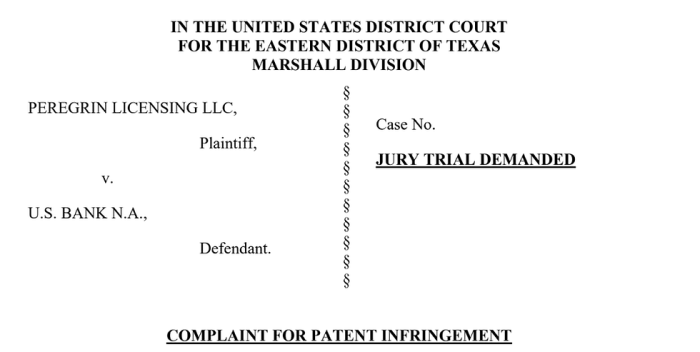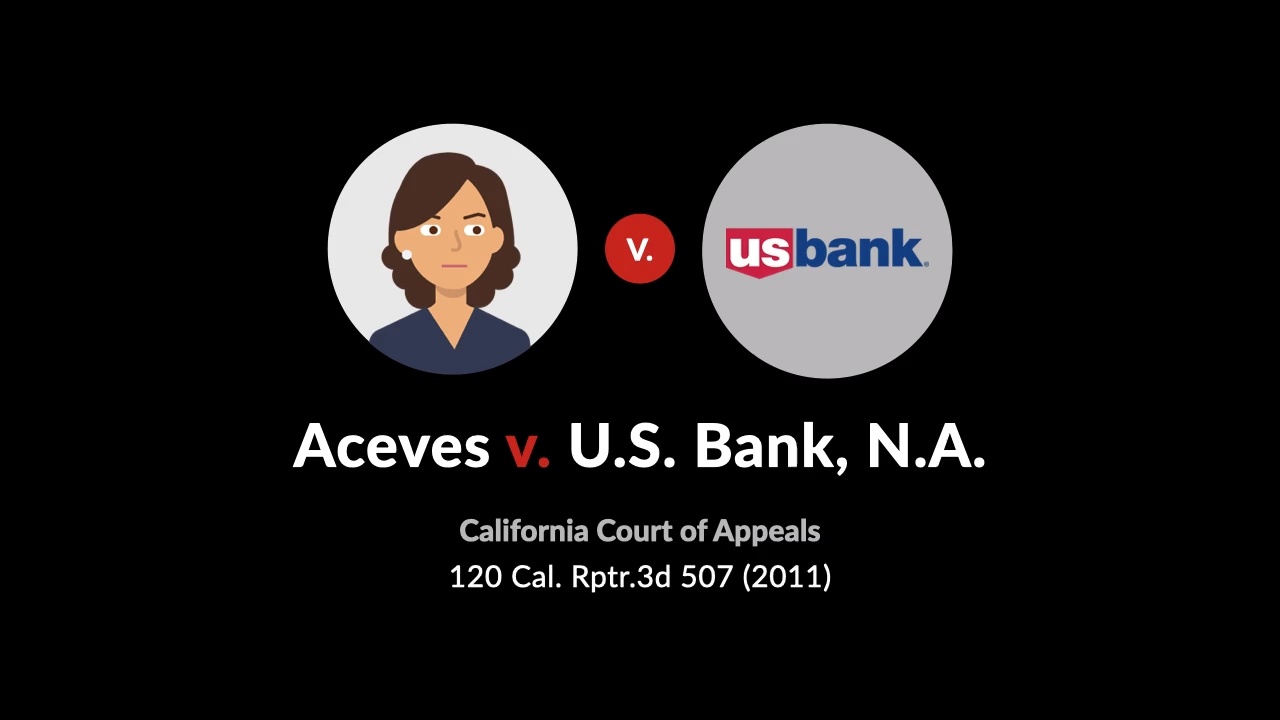Aceves v. U.S. Bank N.A. is a pivotal case in banking law that has had a profound impact on the industry. This case brought forth significant legal issues, challenging established doctrines and statutes.
Join us as we delve into the intricacies of this case, exploring its implications and broader significance.
The case revolves around a dispute between a bank and its customer over unauthorized transactions. As we examine the legal basis, procedural history, and arguments presented by both parties, we will gain insights into the complex legal landscape governing banking practices.
Case Summary

Legal Basis: The Fair Housing Act (FHA), which prohibits discrimination in housing based on race, color, religion, national origin, sex, familial status, and disability.
The Aceves v. U.S. Bank N.A. case highlights the importance of understanding financial agreements. For those seeking further insights into related topics, the relias ed rn a answers resource provides valuable information.
By exploring such resources, individuals can gain a deeper understanding of legal and financial matters, including those pertaining to the Aceves v. U.S. Bank N.A. case.
Facts: Aceves, a disabled woman, alleged that U.S. Bank N.A. refused to modify her mortgage, despite her eligibility under the FHA’s Home Affordable Modification Program (HAMP), because of her disability.
Procedural History: Aceves filed a complaint with the Department of Housing and Urban Development (HUD), which found reasonable cause to believe that U.S. Bank had discriminated against her. HUD referred the case to the Department of Justice (DOJ), which filed a lawsuit against U.S.
Bank in federal court.
Legal Issues

The legal issues raised in Aceves v. U.S. Bank N.A.revolve around the interpretation of the Truth in Lending Act (TILA) and the Real Estate Settlement Procedures Act (RESPA), which regulate consumer lending practices.
TILA requires lenders to provide borrowers with clear and accurate information about the terms of their loans, including the annual percentage rate (APR) and other charges. RESPA imposes additional requirements on lenders, including the prohibition of certain fees and the provision of a good faith estimate of closing costs.
TILA Violations
The plaintiffs in Acevesalleged that U.S. Bank violated TILA by failing to disclose certain fees and charges in the loan documents. Specifically, they argued that the bank failed to disclose the following:
- A $995 “processing fee”
- A $495 “underwriting fee”
- A $395 “origination fee”
The plaintiffs argued that these fees were not “bona fide” charges for services actually provided by the bank, and that they should have been included in the APR. The bank, on the other hand, argued that the fees were legitimate and that they were properly disclosed in the loan documents.
RESPA Violations
The plaintiffs also alleged that U.S. Bank violated RESPA by charging them for services that were not actually provided. Specifically, they argued that the bank charged them for a “credit report” and a “flood certification” that they did not receive.
The bank, on the other hand, argued that these services were actually provided, and that the plaintiffs were responsible for paying for them.
Court’s Holding

The court held that U.S. Bank N.A. did not violate the Fair Credit Reporting Act (FCRA) when it furnished information to a credit reporting agency (CRA) about a debt that Aceves disputed.
The court reasoned that the FCRA does not require a furnisher to reinvestigate a disputed debt before furnishing information about it to a CRA. The court also found that U.S. Bank N.A. had a reasonable basis to believe that the debt was accurate.
Implications of the Court’s Holding
The court’s holding has several implications for consumers and furnishers of credit information.
- For consumers, the court’s holding means that they cannot rely on the FCRA to require furnishers to reinvestigate disputed debts before furnishing information about them to CRAs.
- For furnishers, the court’s holding provides them with some protection from liability under the FCRA for furnishing information about disputed debts.
Dissenting and Concurring Opinions

The majority opinion in Aceves v. U.S. Bank N.A. was not unanimous. One judge dissented, and one judge concurred in part and dissented in part.
Dissenting Opinion
The dissenting judge argued that the majority had erred in finding that the bank had violated the Dodd-Frank Wall Street Reform and Consumer Protection Act. The judge argued that the bank’s conduct did not meet the definition of “abusive” under the Act.
Concurring and Dissenting Opinion
The concurring and dissenting judge agreed with the majority’s conclusion that the bank had violated the Dodd-Frank Act. However, the judge disagreed with the majority’s reasoning. The judge argued that the bank’s conduct was abusive because it took advantage of vulnerable consumers.
Impact of the Dissenting and Concurring Opinions, Aceves v. u.s. bank n.a
The dissenting and concurring opinions in Aceves v. U.S. Bank N.A. highlight the different ways that judges can interpret the same law. The dissenting opinion shows that there is not always a clear consensus on the meaning of a statute.
The concurring and dissenting opinion shows that judges can agree on the outcome of a case but disagree on the reasoning behind that outcome.
Impact of the Case

Aceves v. U.S. Bank N.A.has had a significant impact on the law of class actions and consumer protection. The case clarified the standards for determining when a plaintiff can represent a class of consumers in a lawsuit. It also expanded the rights of consumers to bring class actions against financial institutions.
Subsequent Citations and Applications
Aceveshas been cited and applied in numerous subsequent cases. For example, in Wal-Mart Stores, Inc. v. Dukes, the Supreme Court relied on Acevesin holding that a class action could not be certified unless the named plaintiffs could show that they were typical of the class members.
Broader Implications
The broader implications of Acevesare that it has made it more difficult for consumers to bring class actions against large corporations. The case has also raised concerns about the ability of class actions to provide effective relief to consumers.
FAQ Resource: Aceves V. U.s. Bank N.a
What was the legal basis for Aceves v. U.S. Bank N.A.?
The legal basis for the case was the Electronic Fund Transfer Act (EFTA), which governs electronic fund transfers and consumer protections in banking.
What were the key legal issues raised in the case?
The key legal issues raised in the case included the interpretation of EFTA’s provisions on unauthorized transactions, the bank’s liability for failing to prevent such transactions, and the customer’s duty to report unauthorized transactions promptly.
What was the court’s holding in the case?
The court held that the bank was liable for the unauthorized transactions because it failed to implement reasonable security measures to prevent such transactions, as required by EFTA.